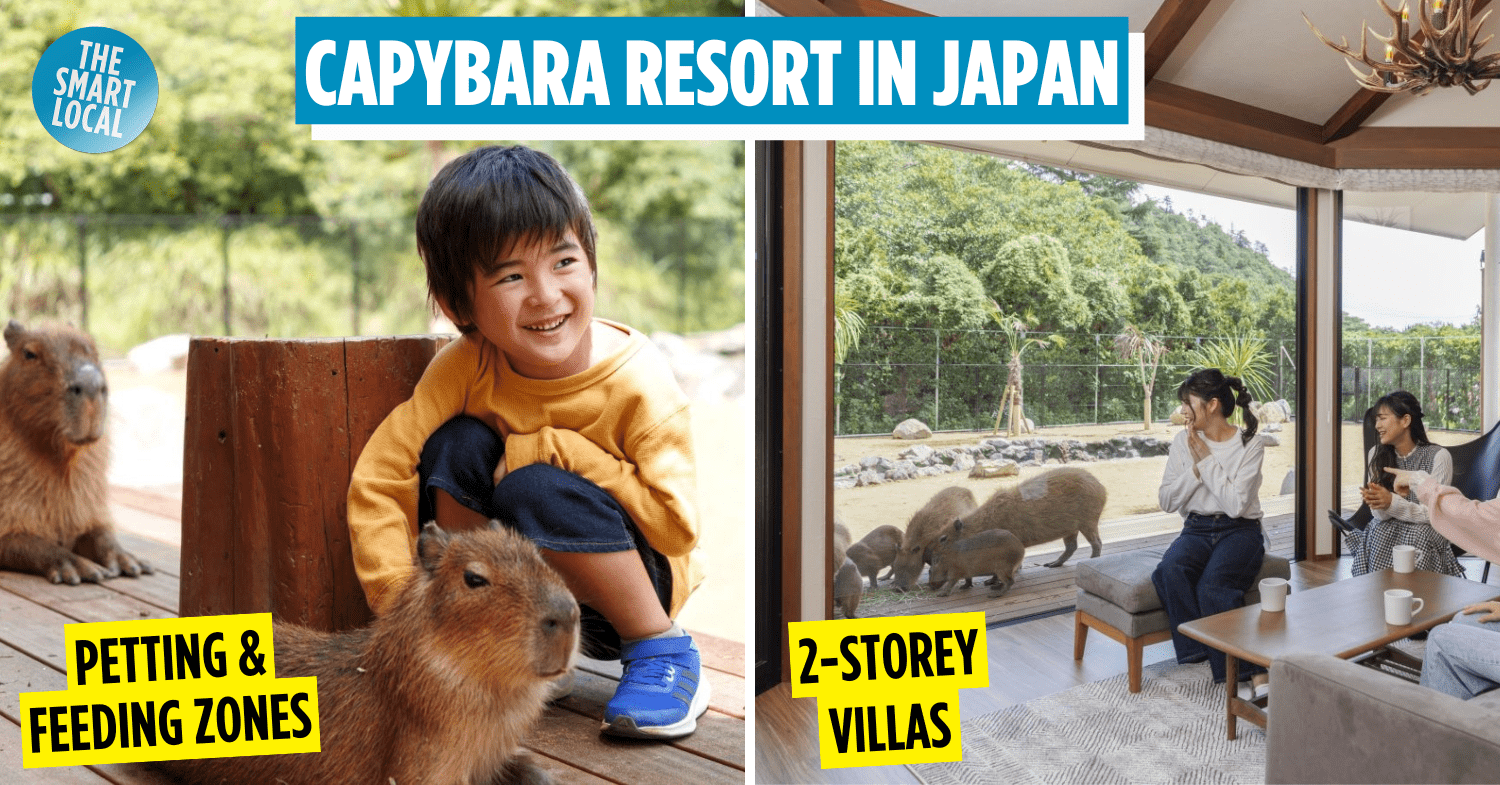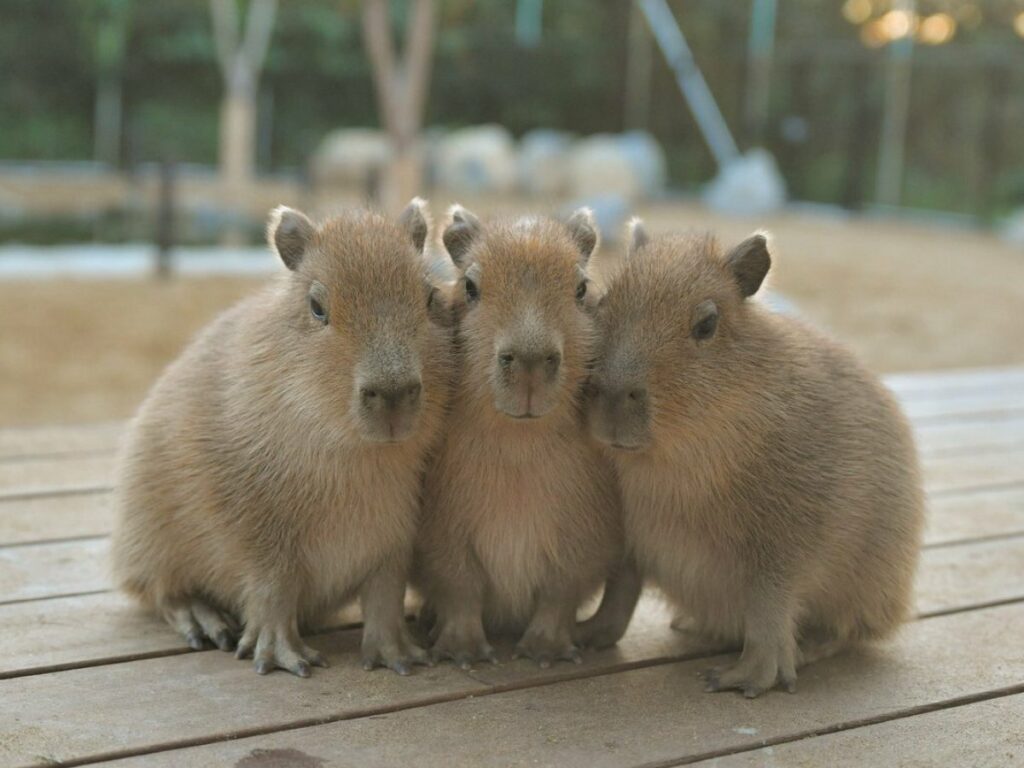Humanized Version
Consider a spot where the planet's biggest rodents, well-known for their calm and friendly manners, greet you with a gentle presence, perhaps even sharing a quiet moment by a warm body of water or a sun-drenched patch of soft ground. This sort of truly special experience, bringing together nature's most relaxed creatures with comfortable places to stay, has become a very appealing idea for many folks seeking something different, especially over in Japan. It's almost like a little dream come true for those who adore animals, offering a kind of peace you don't always find.
The thought of spending time with these truly unique animals, the ones often described as the most laid-back beings you could ever come across, has certainly sparked a lot of interest. People are really quite keen on finding locations where they can observe these creatures up close, maybe even interact with them in a safe, respectful manner. This desire for genuine animal encounters, rather than just seeing them behind a barrier, is something that has, in fact, grown quite a bit lately, signaling a shift in how many of us wish to connect with wildlife.
So, when we talk about a "capybara hotel Japan," it points to a very specific kind of peaceful escape, a place where the charm of these gentle giants meets the comfort of a pleasant stay. It's a concept that truly captures the imagination, offering a chance to step away from the usual quick pace of life and just unwind with some truly remarkable animal companions, creating memories that are, you know, really special and long-lasting for everyone involved.
Table of Contents
- What Makes Capybaras Such Relaxed Companions?
- The Capybara-Friendly Living Space-More Than Just a Room in a Capybara Hotel Japan
- What Do Capybaras Enjoy Eating-And How Does That Fit a Hotel Stay?
- Are Capybaras Really Found in Their Natural Homes-Like a Rainforest?
- How Many Capybaras Are There in the World-A Look at Their Numbers?
- Experiencing the Capybara Hotel Japan-A Unique Animal Connection
- The Appeal of a Capybara Hotel Japan-Why People Love It
- A Day at the Capybara Hotel Japan-Gentle Moments
What Makes Capybaras Such Relaxed Companions?
Capybaras, you know, are often thought of as the ultimate relaxed friends of the natural world, spending their days in the lower parts of wooded areas, where the trees create a kind of leafy ceiling. They are, in a way, just going about their daily routines, enjoying the greenery and taking things very, very easy. Their whole way of being suggests a creature completely at peace with its surroundings, which is something many of us might, you know, really appreciate and even try to learn from. They seem to carry a calm aura, making them truly special to observe.
These creatures have a reputation for being incredibly calm, almost like a gentle presence in any setting. They are, in fact, quite social, often found in small groups, which just adds to their overall peaceful vibe. You'll typically see them moving with a slow, unhurried gait, as if they have all the time in the world, which, in some respects, they do. Their movements are fluid, without any sudden bursts of energy, creating a truly serene picture. This relaxed attitude is, perhaps, one of their most appealing qualities, making them rather easy to be around.
When someone says capybaras are like the "chill bros" of the rainforest, it really captures their easygoing personality. They are the kind of creatures who seem to be in no particular hurry, simply enjoying the moment. This means they spend a good portion of their time just existing, finding comfortable spots to rest, and, you know, letting the world go by. Their presence can actually be quite soothing, a bit like watching a slow-moving river. It's this deep sense of calm that draws many people to them, making them quite popular.
Their natural habit of hanging out in the understory layer, that area beneath the main canopy of trees but above the ground, means they are used to a shaded, somewhat secluded environment. This space offers them cover and access to water, which is something they absolutely love. So, they are often seen near ponds, rivers, or marshy areas, which is where they truly feel at home. This connection to water is, in fact, a big part of their identity, and it shapes much of their daily activities, including where they might choose to rest or, you know, just relax.
They are just cruising around, not with any specific destination in mind, but rather exploring their immediate surroundings at a leisurely pace. This involves, you know, a bit of foraging for food, a bit of sunbathing, and quite a lot of just, well, being. Their daily rhythm is pretty much defined by a relaxed approach to life, showing very little stress. This constant state of ease is a defining feature of their character, making them rather unique among many animal species. It's almost as if they have mastered the art of unwinding.
Taking it easy is not just a phrase for capybaras; it's a way of life. They seem to find comfort in the simplest things, whether it's a warm patch of sunlight, a cool dip in the water, or just lying around with their family members. This kind of simple existence, free from apparent worries, is what makes them so appealing to humans, especially those of us who are looking for a break from our own busy lives. They offer a kind of peaceful escape, you know, just by being themselves, which is really something special to witness.
The Capybara-Friendly Living Space-More Than Just a Room in a Capybara Hotel Japan
When we think about creating a capybara-friendly living space within a capybara hotel Japan, it means going beyond just providing a bed for people. It's about designing an environment that echoes their natural preferences, particularly their love for water and open, grassy areas. This kind of setup would, you know, truly allow these gentle animals to feel comfortable and behave as they naturally would, which is pretty much the whole point of such a special place.
Given their habit of hanging out in the understory layer, a capybara hotel Japan would need to offer spaces that are somewhat sheltered yet open, perhaps with plenty of plants and natural textures. This could mean large, outdoor enclosures with access to a shallow pool or a small stream, mimicking the wetlands they adore. The presence of water is, in fact, absolutely vital for their well-being, allowing them to cool off and stay hydrated, which they do very, very often.
A truly good capybara hotel Japan would also feature ample soft ground, like grassy areas or even sand, where these creatures can stretch out and rest. They are, you know, quite fond of napping in the sun or in a shady spot, so providing diverse resting places is quite important. These areas would need to be kept clean and safe, offering a peaceful retreat for the capybaras, allowing them to just be themselves without any undue disturbance.
The design of a capybara hotel Japan might also include elements that encourage their social behaviors, such as communal feeding areas or spots where they can gather together. Since they are quite social animals, having spaces where they can interact with each other, and possibly with guests under careful supervision, would make the experience much richer for everyone involved. It's about creating a harmonious coexistence, you know, between human visitors and the capybara residents, which is really a delightful thought.
So, a capybara hotel Japan isn't just about putting capybaras in a building; it's about building a special kind of home for them that guests can visit and enjoy. This means thinking about their needs first, providing plenty of room to roam, fresh water for swimming and drinking, and a variety of textures and plants that make them feel right at home. It's a bit like creating a mini-habitat, actually, where both people and capybaras can find a sense of peace and connection, which is pretty much what makes it so appealing.
What Do Capybaras Enjoy Eating-And How Does That Fit a Hotel Stay?
Capybaras are, you know, creatures that primarily take sustenance from plant matter, and they spend a good portion of their day just munching on plants. Their natural diet consists mostly of grasses and aquatic plants, which they find in abundance in their native environments. This constant grazing is, in fact, a very typical behavior for them, helping them to get all the nutrients they need throughout the day, which they do, you know, quite consistently.
It's also known that a capybara is quite fond of certain vegetables, and they are often given things like potatoes and carrots as part of a varied diet in human care. These items, while not their main food source in the wild, provide good nutrition and are, you know, rather enjoyed by these animals. So, a capybara hotel Japan would likely incorporate these sorts of treats into their feeding routines, making sure the capybaras get a balanced intake of food, which is, of course, very important for their health.
In a capybara hotel Japan setting, the food provided for the capybaras would be carefully managed to ensure it meets their specific dietary requirements. This might involve offering fresh, high-quality grasses, perhaps even grown on site, along with a regulated amount of vegetables like those potatoes and carrots. Guests might even have the opportunity, under supervision, to offer some of these approved treats, creating a very direct and memorable interaction with the animals, which is, you know, pretty cool.
The process of feeding in a capybara hotel Japan would likely be a gentle and calm affair, reflecting the capybaras' own peaceful nature. There would be no rushing or competition, just a steady supply of good food for them to enjoy at their leisure. This thoughtful approach to their diet is, in fact, a key part of ensuring their well-being and happiness within the hotel environment, making it a truly pleasant experience for them, and for anyone watching.
So, while their main diet is based on the green things that grow around them, the addition of specific vegetables like potatoes and carrots shows how well they adapt to different food sources when cared for by people. A capybara hotel Japan would, therefore, be a place where their nutritional needs are met with great care, allowing them to continue their relaxed lifestyle, which, you know, involves quite a bit of gentle eating throughout the day, as a matter of fact.
Are Capybaras Really Found in Their Natural Homes-Like a Rainforest?
When people ask, "Are there capybaras in the rainforest?" it's a good question, because while they are creatures of South America, their preferred homes are a bit more specific than just any rainforest. They do, in fact, live in areas that are often quite green and lush, but they have a very particular requirement: water. This means they are usually found in places where there are plenty of rivers, lakes, ponds, or marshy lands, which they rely on very, very heavily.
Their natural environments are typically wetlands, savannas, and dense forests near bodies of water. So, while a rainforest might contain some of these watery areas, it's the presence of water that is the truly defining factor for where capybaras make their homes. They use the water for many things: for cooling off, for escaping from things that might want to harm them, and for finding some of their food. It's almost like their personal swimming pool and safety zone all in one, you know.
The idea of a capybara hotel Japan, therefore, aims to recreate some aspects of this watery, comfortable habitat, even if it's not a vast South American wetland. The goal is to provide enough space and the right kind of environment so that these animals can display their natural behaviors, such as swimming, lounging by the water's edge, and grazing on plants. This attention to their needs is, in fact, what makes such a hotel concept so appealing and, you know, pretty much successful.
So, while you might not find them deep within every part of a dense, dry rainforest, you will absolutely find them where there's a good supply of water, surrounded by plenty of plant life. This preference for water-rich areas is a key part of their existence, shaping where they live and how they spend their days. It's a bit like how we prefer certain climates; capybaras have their own specific preferences for where they feel most at home, which is, you know, quite clear when you see them.
Their adaptation to these watery surroundings is, in some respects, quite remarkable. They have webbed feet and their eyes, ears, and nostrils are placed high on their heads, allowing them to stay mostly submerged while still being able to see, hear, and breathe. This design makes them very, very good at living in and around water, which is a big part of what makes them so unique. A capybara hotel Japan, therefore, tries to honor these natural inclinations, offering them the watery comfort they truly appreciate.
How Many Capybaras Are There in the World-A Look at Their Numbers?
When someone asks, "What is the population of capybaras?" it's a good question that speaks to their presence across the globe. While getting an exact, up-to-the-minute count for wild animals can be quite a challenge, it's generally understood that capybaras are not considered to be in danger of disappearing. They are, in fact, quite widespread across South America, where they live in large numbers in many different areas, which is, you know, pretty good news.
Their numbers are generally stable, and in some regions, they are actually quite common. This is partly due to their adaptability to different environments, as long as there's plenty of water and vegetation. They are also, in some respects, quite good at living alongside people, especially in agricultural areas where they might find new sources of food. This ability to coexist has, in fact, helped their populations remain healthy, which is something we can all appreciate.
So, while a precise global figure might be hard to pin down, the general picture is that capybaras are doing quite well. They are not listed as a species that is facing a high risk of becoming extinct, which means you're likely to find them in many parts of their natural range. This widespread presence means that places like a capybara hotel Japan are able to ethically source their animals, ensuring that their presence there does not harm the wild populations, which is, you know, a very important consideration.
The fact that their numbers are relatively strong also speaks to their success as a species. They are, in a way, quite robust and able to thrive in various conditions, as long as their basic needs for water and food are met. This resilience is, perhaps, one of the reasons they are so well-suited to living in environments where they might interact with humans, such as in a capybara hotel Japan, where their gentle nature can be truly appreciated by many visitors.
So, if you're wondering about the overall health of the capybara population, the outlook is, thankfully, quite positive. They are not a rare sight in their native lands, and their ability to adapt has allowed them to maintain a strong presence. This general abundance means that the concept of a capybara hotel Japan is built upon a foundation of healthy animal populations, allowing for responsible and enjoyable interactions with these truly unique and peaceful creatures, which is, you know, really what it's all about.
Experiencing the Capybara Hotel Japan-A Unique Animal Connection
A capybara is, without a doubt, a creature that is often described as having a truly delightful appearance, sometimes called "flufee and cute." This natural charm is a big part of what makes the idea of a capybara hotel Japan so appealing to so many people. It's not just about seeing an animal; it's about experiencing the gentle presence of a creature that seems to radiate calm and a kind of soft, approachable beauty, which is, you know, quite special.
The appeal of a capybara hotel Japan comes from the chance to connect with these animals on a very personal level. Imagine being able to sit quietly near a capybara, observing its slow movements, or perhaps even offering a piece of approved food from your hand. These sorts of moments create a truly unique bond, something that goes beyond just looking at an animal in a zoo. It's about shared space and mutual respect, which is pretty much the core of the experience.
Their soft, somewhat coarse fur and their calm, expressive eyes contribute greatly to their endearing appearance. They often look as if they are smiling, or at least in a state of contentment, which is, you know, quite infectious. This visual appeal, combined with their gentle


